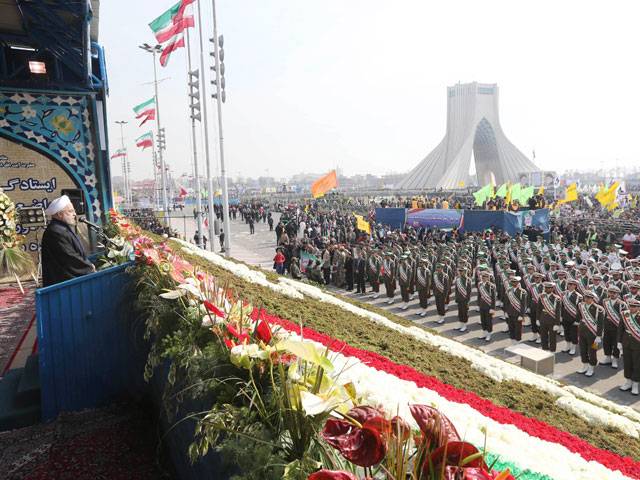TEHRAN - President Hassan Rouhani dismissed on Tuesday a Western assertion that military force could yet solve a decade-old nuclear dispute if negotiations proved fruitless, pledging that Iran would pursue peaceful atomic research “forever”.
In a speech marking the 35th anniversary of the 1979 Islamic revolution, Rouhani also attacked economic sanctions imposed by the West as “brutal, illegal and wrong” and said countries in the region had nothing to fear from Iran.
Iran’s military test-fired two new domestically made missiles on Monday, a gesture of national resolve ahead of talks next week with world powers to try to reach an agreement on curbing Tehran’s nuclear programme.
Analysts said the missile test, and a reported plan by Iranian warships to cross the Atlantic to approach US shores, were aimed at a placating Iranian hardliners opposed to talks with major powers intended to settle the nuclear dispute.
Rouhani said Western officials continued to argue that if such discussions came to nothing, there was always the option of using military force against its nuclear facilities.
“I say explicitly to those delusional people who say the military option is on the table, that they should change their glasses ... Our nation regards the language of threat as rude and offensive,” he said.
“I want to expressly announce that the movement of the Iranian nation towards the peaks of scientific and technical progress and advancement, including peaceful nuclear technology, will be forever,” he added.
Iran and six world powers struck an interim deal in November under which Tehran agreed to limit parts of its nuclear work in return for the easing of some international sanctions.
Hardliners, unsettled by the foreign policy shift since Rouhani was elected in June, have repeatedly criticised the agreement. Iran’s most powerful authority, Supreme Leader Ayatollah Ali Khamenei, has so far backed the deal.
Farhang Jahanpour of Oxford University’s Faculty of Oriental Studies said the missile test was a message of reassurance aimed at Iranian hardliners wary of the deal.
“The message is that ‘we are not surrendering, we are still OK, we are still winning points’. The idea is to blunt the criticism of those who don’t like the negotiations,” he said.
Jahanpour said an announcement that Iran would send warships toward US maritime borders also fell into the category of government “propaganda” aimed at a domestic audience each year on the revolution’s anniversary.
Richard Weitz, Director of the Center for Political-Military Analysis at the Hudson Institute in the United States said the political message of the test was that “Iran can defend itself even without nuclear weapons”. “It would be helpful, from the proliferation point of view, if Iranian leaders genuinely believed this,” he said.
Iran and the six powers will start negotiating a full agreement in Vienna on Feb. 18. Easing of sanctions, imposed on Iran over its nuclear activities, began in late January.
In recent weeks Iranian officials have repeatedly criticised US Secretary of State John Kerry for speaking about a potential military option, something his counterparts in several other Western countries have also continued to do.
Meanwhile, Iran’s prosecutor general said Tuesday that opposition leaders Mir Hossein Mousavi and Mehdi Karroubi will remain under house arrest over anti-government protests until they “repent”, Fars news agency reported.
Mousavi and Karroubi have been held incommunicado under separate house arrests since February 2011, accused of orchestrating massive, unprecedented street protests sparked by a disputed presidential election in 2009.
Prosecutor general Gholam Hossein Mohseni Ejeie said they had committed a “great crime and treason”. “Until time the sedition leaders (agree to) repent... the situation will remain as before,” he said.
The protests turned deadly when authorities resorted to a heavy-handed crackdown in which thousands of protesters, reformist activists and journalists were arrested.
Mousavi and Karroubi had claimed that the 2009 election of Mahmoud Ahmadinejad as president for a second term had been rigged.
“Some people are pointlessly trying to lift the house arrests, but (their efforts) will not bear any fruit,” said Mohseni Ejeie, without further details.
The fate of Mousavi and Karroubi - both of whom are reportedly suffering health problems - has attracted global attention and triggered heated debates at home.
In December influential Iranian lawmaker Ali Motahari, a conservative, said the judiciary should end the house arrests of Mousavi and Karroubi on put them on trial.
“The protracted house arrests without trial lack legal or religious justification,” Motahari told parliament in remarks carried by the ISNA news agency.
Last week Karroubi was moved from a safe house to his own home, but still kept under house arrest, leading some to believe Iran was easing the terms of detention.
President Hassan Rouhani, a reputed moderate, pledged after his election victory in June 2013, to work for political and cultural liberalisation in Iran.
But he has stopped short of becoming directly involved in the case of Mousavi and Karroubi.
But in September, the authorities freed around 15 reformists, journalists and lawyers, notably prominent rights lawyer Nasrin Sotoudeh.
Friday, April 19, 2024
N-programme ‘forever’: Rouhani
Iran marks 35th anniversary of Islamic revolution

Caption: N-programme ‘forever’: Rouhani
8:27 AM | April 19, 2024
8:09 AM | April 19, 2024
Empowering Women: The Vision of Maryam Nawaz Sharif
8:37 PM | April 19, 2024
President Zardari confers Nishan-i-Imtiaz (M) award on Turkish CGS
8:23 PM | April 19, 2024
NA speaker suspends two MNAs for disruptive behavior during presidential address
8:20 PM | April 19, 2024
PM Shehbaz orders accelerating countrywide drive against smuggling
8:19 PM | April 19, 2024
LHC allows PTI to hold rally in NA-119
8:18 PM | April 19, 2024
A Tense Neighbourhood
April 19, 2024
Dubai Underwater
April 19, 2024
X Debate Continues
April 19, 2024
Hepatitis Challenge
April 18, 2024
IMF Predictions
April 18, 2024
Kite tragedy
April 19, 2024
Discipline dilemma
April 19, 2024
Urgent plea
April 19, 2024
Justice denied
April 18, 2024
AI dilemmas unveiled
April 18, 2024
ePaper - Nawaiwaqt
Advertisement
Nawaiwaqt Group | Copyright © 2024





